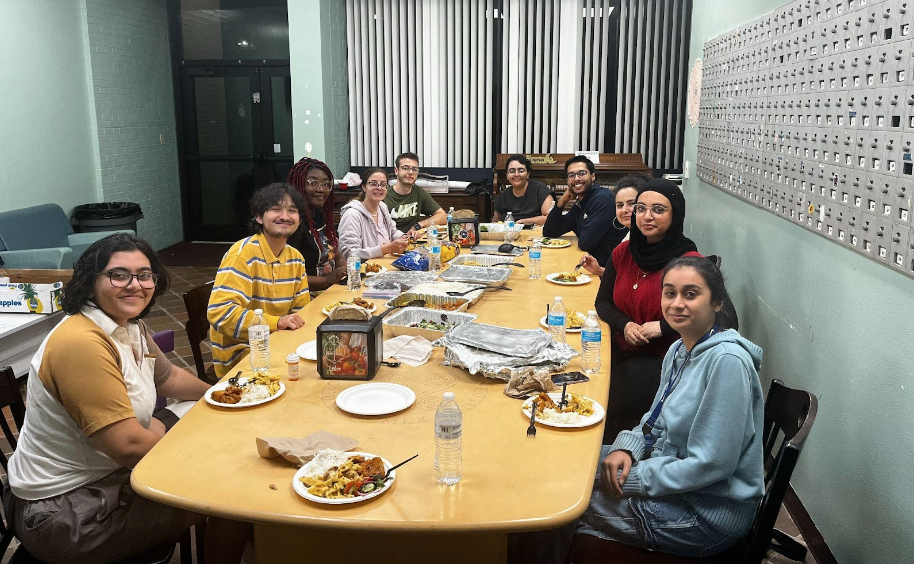Muslims celebrated Ramadan this year between March 10 and April 9. According to the Islamic Networks Group, “In Ramadan, Muslims commemorate the revelation of the Qur’an and fast from food and drink during the sunlit hours as a means of drawing closer to God and cultivating self-control, gratitude and compassion for those less fortunate.”
The Catalyst has covered Ramadan in previous years, and sometimes Muslim students have faced struggles. Third-year and Muslim Student Association (MSA) Co-president Nisreen Kalai shared her experiences celebrating Ramadan since coming to New College and how she organized it this year for participating students.
In 2022, Associate Professor of Sociology Queen Zabriskie and the now abolished Office of Outreach and Inclusive Excellence (OOIE) had a large part in helping students get meals, since the Hamilton “Ham” Center dining hall closed before it was time to break fast. “We would gather every weekday outside Boar’s Head and break our fast,” Kalai recalled. “Fridays and weekends the local mosque had food so people could go there. The food was fine. Not terrible, but not great. It was nice to not have to worry about where we had to eat, picking up food, or cooking.”
In Spring 2023 Metz did not provide this option. A student was able to secure funds from the Novo Collegian Alliance (NCA) and fasting students were able to order food. However, being able to pick up the food proved to be difficult. Sometimes, iftar, the fast-breaking meal after sundown, could not be put together.
Kalai took the lead on organizing Ramadan for the MSA this school year. “I went to Metz to try to get the same option that we had in 2022 and I was told that was not possible,” Kalai said. “At first, I was told they couldn’t do anything to support us but then a week before Ramadan I was told that Ham will offer one station with halal chicken that students can get to-go and heat up at their convenience.”
But this bandage solution did not sit well with Kalai. She said, “I wanted to have communal iftars to celebrate the spirit of Ramadan, especially because this is such an important time and we don’t get to be with our families.”
The NCA was contacted again but Kalai said they did not have funds to put towards this project. The MSA was referred to the student government-controlled SAC and was able to secure money for less expensive items such as plates, utensils and dates. Dates are commonly eaten first at iftar. Other resources Kalai reached out to included Interim Dean of Studies Manuel Lopez and the local mosque, Islamic Society of Sarasota and Bradenton (ISSB).
“After the meeting, Professor Lopez offered for the Provost to cover three meals a week and the mosque agreed to provide three meals a week. So we have people from the mosque cook for us three days a week which is incredibly generous of them. Professor Lopez also helped us reserve the New College van to go to the mosque on Fridays,” Kalai explained.
Kalai voiced her desire for more institutional support for this annual event, instead of having it be largely student-led. “We can look at so many institutions and see how they have some level of support for Muslim students year-round but especially during Ramadan,” she said. “To break one’s fast with reheated food from a to-go box is just not a good option, especially when we can look to 2022 when they did offer something more.
“Another challenge is, because we either order food or have someone cook for us, we have to pick up the food. This is a challenge because not everyone has a car and even for those of us who do, we might not be free every day to pick up,” she continued. “Usually, if no one else is available, I go pick up the food but this has been hard to balance with my other commitments.”
Still, Kalai wasn’t discouraged. “I think it’s a direct correlation of advocating for ourselves that we were able to figure things out. The Provost as well as many professors I’ve spoken with have been super supportive. Most people are genuinely willing to help,” she noted.
Despite the challenges, the MSA was able to hold another successful Fast-a-Thon event, a tradition started last year by Kalai and another student. All were invited to participate in Ramadan for a day by fasting. A community-wide iftar was then held on Z-Green on March 30, 2024 so all could break fast together.

Kalai said that her favorite part of Ramadan was its communal aspect, which is present and strong even with a small number of Muslim students on campus. “For some people, Ramadan can be a triggering time of year or a time where people feel in limbo with their faith and identity.
“What I love about our little Muslim community is that we don’t really care about how religious or not religious you are or any of those things,” she continued. “We really try to make it a safe space for everyone. Everyone is welcome to fast and eat with us no matter how they identify.”

